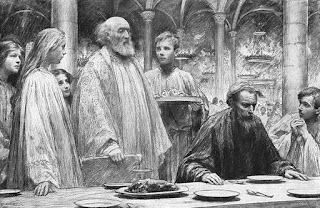1st Michaelmas
Matthew 22, 1-14 (adapted from Madsen)
And Jesus continued to speak in
parables to them:
 |
| Corina Ferraz |
The kingdom of the heavens arising in human hearts
is like a man, a king, who prepared a marriage feast for his son. And he sent
out his servants to call the guests who had been invited to the marriage, but
they would not come.
Then
he again sent out other servants, and said, “Say to those who have been
invited, ‘Think, I have prepared my best for the banquet, the sacrificial oxen
and fattened cattle have been slaughtered; everything is ready. Come quickly to
the wedding.”
But they were not interested and went off, one
going to his field to be his own master, another falling into the hectic pace
of his own business. The rest, however, took hold of the servants, mistreated
them, and killed them.
Then the king grew angry; he sent out his army,
brought the murderers to their destruction, and burned their city. Then he said
to his servants, “Although the marriage feast is prepared, the invited guests
have proved themselves unworthy. Go out therefore to the crossroads of destiny
and invite to the wedding whoever you can find.”
And the servants went into the streets and gathered
together all whom they found, both bad and good. And the wedding hall was
filled with guests.
 |
| Eugene Burnand |
Then the king came in to see the guests, and among
them, he noticed a man who was not dressed in the wedding garment, which was offered to him. And he said to him,
“My friend, you are sharing the meal; how is it you came in here without putting
on the wedding garment that was offered to you?”
But the man was speechless.
Then the king said to the servants, “Bind him hand
and foot and cast him out into the darkness, where human beings wail and gnash
their teeth. For the call goes out to many, yet only a few make themselves
bearers of the higher life.”
1st Michaelmas
September 29, 2019
Matthew 22, 1-14
 A wedding is an occasion for joy. The whole community
rejoices when a couple finds their way to each other on earth. For indeed, their
union is a symbol of the work that each of us is meant to do inwardly.
A wedding is an occasion for joy. The whole community
rejoices when a couple finds their way to each other on earth. For indeed, their
union is a symbol of the work that each of us is meant to do inwardly.
Like the partners in a couple, we each of us have two
contrasting capacities.
Individually we have a kind of willpower that is like
an arrow – actively and unswervingly headed toward a goal. This kind of will
has a masculine quality. We also have a will that is more like a vessel – open,
able to receive, to bear, and to let go. This kind of softer will has a more
feminine quality. |
| Rosetti |
It is our human task, as an individual, to integrate and
harmonize both of these types of will, the softer receptivity, and the
goal-directed will, within ourselves in a way that is fruitful and
productive. We could call it the wedding
of the masculine and the feminine within our soul. This kind of integration is
also the goal of an earthly partnership.
Today’s reading, the wedding of the King’s Son, represents a
third level of wedding. It is the wedding of the will of God to the receptive
soul of humanity. The king’s son, Christ, has pledged himself to the soul of
humanity on earth, and to the earth itself. He is Love Incarnate, the Being of
Love itself. The Father has invited us all to this wedding and urges us to
accept the invitation so that humanity can progress. Yet respecting our freedom, He allows us our
choice. However, being immersed only in business, being only one’s own master,
unwilling to respond properly to what is being offered can lead us into
destruction. The arrow of self-will turns against us.
Collectively we are to cultivate openness and receptivity so that we can heed the invitation and put on the garment of open prayer. We
are to receive the Bridegroom in the joy and celebration that is offered to us.
We will find Him in our appreciation of the wonders of the created world, in
the compassion of hearts, in deeds motivated by conscience. In the words of
Mary Oliver:
When it's over, I want to say:
all my life
I was a bride married to
amazement.
I was a bridegroom, taking the
world into my arms.*
*Mary Oliver, “When Death Comes” in New
and Selected Poems, Volume I



















